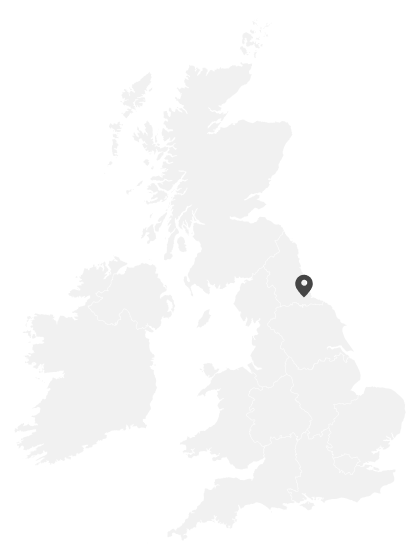Nursing in Sunderland: studying, working, and living guide
Find out about nursing in Sunderland - where nurses can find jobs, the hospitals they might work in, colleges & universities to study in, plus living information.

Sunderland is a port city in Tyne and Wear located on the River Wear, in the northeast of England. It is the second largest city in the historic county of Durham.
Sunderland has recently been voted as one of the best places to live in the UK, thanks to its affordability and seaside location, meaning it could be an ideal place to study and work in.
This guide is for nurses looking to move to Sunderland, and includes helpful information about the city, such as cost of living and travel, through to culture and nightlife.
Where do nurses work in Sunderland?
There are both NHS and private hospitals all over Sunderland, each offering a range of services and departments. This includes:

Sunderland Royal Hospital

Sunderland Eye Infirmary

Monkwearmouth Health Centre

South Tyneside District Hospital (South Shields)
Hospitals in the city are operated by the South Tyneside and Sunderland NHS Foundation Trust, which employs over 8,300 healthcare professionals. Across Sunderland, there are also numerous local health centres, GP surgeries, and care homes that support all needs and ages. They are frequently on the lookout for Registered Nurses as well as carers.

Where can aspiring nurses study in Sunderland?
The University of Sunderland offers outstanding courses for anyone wanting to study nursing in collaboration with local Trusts to support the growth of nursing across the city. Start dates for courses are in April and September.
The University of Sunderland has two campuses in the city. The Sir Tom Cowie Campus adjacent to the River Wear and the City Campus located in the city centre, which is the main campus for nursing students.
The University of Sunderland has made outstanding progress in terms of supporting its students and staff and now places at number 50 in The Guardian University Guide 2023 - a significant rise of 42 places compared to 2022 and its highest ranking in a decade. It was also nominated as the University of the Year in the Times Higher Education Awards in 2021. It is currently the only University in Sunderland.
Sunderland College also offers a range of nursing courses at different qualification levels for anyone who is interested in studying the subject.
Find our nursing university guide here.
The average monthly rental in Sunderland is around £750 per month which is considered very reasonable and far cheaper than living in other major cities such as Manchester, Liverpool, or London.
Where do nurses live in Sunderland?
There are many great places in Sunderland waiting for nursing students and nurses to move in! These include:
Sunderland City Centre
Popular with students, nurses, and professionals due to its central location, and its closeness to the University of Sunderland City Campus and local amenities.
Monkwearmouth
Popular with students due to its proximity to the University of Sunderland Sir Tom Cowie Campus, as well as providing many places to walk and explore along the banks of the River Wear.
Millfield
An ideal location for students with lots of restaurants and shops on the main Hylton Road.
Thornhill
Offers excellent connections for students, Nurses, and professionals, thanks to its adjacency to both the University of Sunderland City campus and Sunderland Royal Hospital.

What are the living costs for nurses in Sunderland?
Sunderland is one of the more affordable UK cities to live in.
Here is a general guide to some of the different costs of living in Sunderland.

The average price for a home in Sunderland is currently £162,000 which is lower than the national average of £293,000.

The average rental price for a property in Sunderland is £750 per month. But if you are looking to rent a room in a shared house, the average cost is just over £400.

Council tax costs vary across the city. But many people reside in a Band B property or similar, which means paying £1090.00 a year, which works out to just over £90 per a month.

Other bills like shopping and utilities are priced the same as the rest of the UK.
The affordability of Sunderland cannot be understated: it is amongst the ten cheapest cities in the UK for dining and entertainment.
Is travel easy in Sunderland?
Sunderland is well connected when it comes to transport, This makes travel super easy in Sunderland.
The A19 runs north-to-south crossing the River Wear and providing access north to the Tyne Tunnel joining up with the A1 to Edinburgh, and south through Teesside, joining up with the A1M providing connection to the M1. By road London is 4 hours and 30-minute drive whereas Glasgow and Edinburgh are a three-hour drive. The A184 connects Sunderland to Newcastle.
Sunderland Railway Station is in the city centre and has regular direct trains to London which take just over 3 hours, while Edinburgh is within two hours. Taking the train is often a lot quicker than driving to Sunderland.
The nearest major airports are Newcastle International Airport and TeeSide International Airport which are less than 1 hour drive away from Sunderland. Both airports fly to destinations across the world and the UK.

What to do in Sunderland: walks, culture, nightlife and eating out
Sunderland offers plenty of exciting options for your valuable free time, whether you prefer leisurely Sunday strolls, fine dining, or fun nights out.
Culture and attractions
Sunderland has numerous cultural attractions for any nurse, student or professional to experience, and is popular with visitors both from the UK and further afield.
Hylton castle is a historic landmark where you can learn more about the history of the Northeast, and the Hetton Colliery Railway is one of the top places to explore Sunderland’s mining heritage. Sunderland’s Roker Pier and Lighthouse are ideal places to walk and take in the coast, and a trip to the Penshaw Monument, located at the top of Penshaw Hill, gives you the opportunity to take in some stunning views of local countryside.
If you are interested in the arts scene, Sunderland is well catered for with museums and galleries to visit. There is the Sunderland Museum, Library and Winter gardens, and the Northern Gallery for contemporary art- which also houses the National Glass Centre. Music fans should head for The Fire Station and Independent, both of which offer live music spanning multiple genres, while The Sunderland Empire is a renowned theatrical venue.
Sunderland Association Football Club Play Championship football at Stadium of Light which is the one of the largest football grounds in England.
Nightlife and eating out
Sunderland has lots of nightlife options which include restaurants, bars and clubs. Highlights include:
The Fire Station, known for hosting a variety of events which include awards and live music events.
Aperitif, the number one restaurant in Sunderland according to TripAdvisor reviews.
Asiana Fusion Restaurant provides the excellent views of the River Wear while offering a great dining experience.
Borneo Bistro, known for their top-class cuisine.
There is plenty to see and do in Sunderland for a great price!
What are the school options in Sunderland?
There are many great school options in Sunderland; the city boasts 91 Primary schools, 30 Secondary schools and 2 private independent schools.
Sunderland has a total of 95 Ofsted rated Outstanding or Good schools.
Personal preference plays a big part in choosing a school for your children, but there are plenty to choose from in Sunderland.
Population and demographics in Sunderland
Here are some of the stand-out population and demographic facts in Sunderland.
Sunderland has a population of 345,000
Its population density is 2,022 people per square mile.
Sunderland port is the second largest port in the UK with 17 quays.
6.2% of Sunderland’s population is unemployed - higher than the UK average.

In summary: is Sunderland a good place to be a nurse?
Overall Sunderland is a great place to live, study and work in. Living costs are lower than the national average, meaning you’ll be able to make the most of your personal free time as a student or nursing professional.
The city also has great travel connection links across the UK via bus, car, or train, as well as links to international destinations thanks to its proximity to two major airports.
Nurses earn an average of just over £39,400 per a year in Sunderland- which is slightly more than other cities.
So, your salary as a Registered Nurse goes much further. Here are a couple of examples:
As a Newly Qualified Nurse on an NHS Band 5 salary, if you rented a house, you would still have more than £1200 left in your pocket each month for everything else. Your disposable income in the Southeast would barely reach half of this figure, for example.
As a Band 6 nurse, you would easily be able to borrow enough money to buy a joint mortgage an average-priced flat in Sunderland fact, in many parts your salary would cover the cost of buying a house.
For nurses and nursing students, Sunderland offers a fun, affordable, and lively place to call home.




